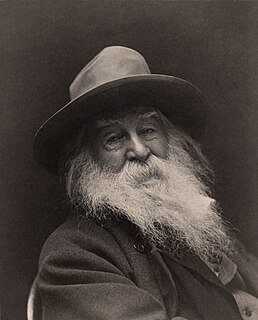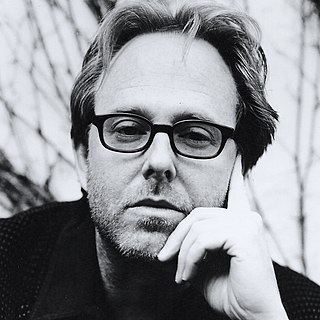
Walter Whitman was an American poet, essayist and journalist. A humanist, he was a part of the transition between transcendentalism and realism, incorporating both views in his works. Whitman is among the most influential poets in the American canon, often called the father of free verse. His work was controversial in its time, particularly his 1855 poetry collection Leaves of Grass, which was described as obscene for its overt sensuality.

Leaves of Grass is a poetry collection by American poet Walt Whitman. Though it was first published in 1855, Whitman spent most of his professional life writing and rewriting Leaves of Grass, revising it multiple times until his death. There have been held to be either six or nine individual editions of Leaves of Grass, the count varying depending on how they are distinguished. This resulted in vastly different editions over four decades—the first edition being a small book of twelve poems, and the last, a compilation of over 400.

"Song of Myself" is a poem by Walt Whitman (1819–1892) that is included in his work Leaves of Grass. It has been credited as "representing the core of Whitman's poetic vision."
I Sing the Body Electric, or similar, may refer to:

Richard Wright Nowels Jr. is an American songwriter, record producer, multi-instrumentalist and arranger. He has co-written and co-produced over 90 hit singles with multiple artists and his songs have appeared on over 250 million albums. In 2020 he was inducted into the Songwriters Hall of Fame.
Body Electric may refer to:

I Sing the Body Electric! is a 1969 collection of short stories by Ray Bradbury. The book takes its name from an included short story of the same title, which in turn took the title from a poem by Walt Whitman published in his collection Leaves of Grass.

Elizabeth Woolridge Grant, known professionally as Lana Del Rey, is an American singer-songwriter. Her music is noted for its cinematic quality and exploration of tragic romance, glamour, and melancholia, with frequent references to contemporary pop culture and 1950s–1960s Americana. She is the recipient of various accolades, including two Brit Awards, two MTV Europe Music Awards, and a Satellite Award, in addition to nominations for six Grammy Awards and a Golden Globe Award. Variety honored her at their Hitmakers Awards for being "one of the most influential singer-songwriters of the 21st century."

Paradise is the third EP by American singer-songwriter Lana Del Rey. It was released on November 9, 2012 in Australasia and November 11, 2012 worldwide by Polydor & Interscope. It was additionally packaged with the reissue of her second studio album, Born to Die (2012), titled Born to Die: The Paradise Edition. Del Rey enlisted collaborators including producers Rick Nowels, Justin Parker and Rick Rubin. The EP's sound has been described as baroque pop and trip hop.

"Burning Desire" is a song by American singer and songwriter Lana Del Rey. Initially available for immediate digital download upon pre-ordering Del Rey's third EP, Paradise. "Burning Desire" was released as a promotional single on March 19. On Valentine's Day of 2013, a music video for the song was released. Lyrically composed by Lana Del Rey and her long-time collaborator, Justin Parker, the record was produced by Emile Haynie.
"Bel Air" is a song by American singer and songwriter Lana Del Rey. It appears on her third extended play, Paradise. Featuring clips from the "Summertime Sadness" music video, a promotional video for "Bel Air" was released to YouTube in early November 2012. The video has received much critical acclaim. After the release of Paradise, the song charted in the United Kingdom and France.
"Gods & Monsters" is a song by American singer and songwriter Lana Del Rey from her third extended play Paradise and the reissue of her second album Born to Die, Born to Die: The Paradise Edition. "Gods & Monsters" was released on November 9, 2012, with the rest of the Paradise EP.

"Young and Beautiful" is a song by American singer and songwriter Lana Del Rey used for the soundtrack to the drama film The Great Gatsby.

Tropico is a short film "based on the Biblical story of sin and redemption", starring Lana Del Rey as Eve and Shaun Ross as Adam. Written by Del Rey and directed by Anthony Mandler, the film premiered at the Cinerama Dome in Hollywood, California on December 4, 2013, before being uploaded to Del Rey's official Vevo account the following day. It features the songs "Body Electric", "Gods & Monsters", and "Bel Air", all are taken from Del Rey's 2012 EP Paradise. An EP of the film's name was also released the same month to the iTunes Store. It includes the film itself along with the three songs.

"Ultraviolence" is a song recorded by American singer and songwriter Lana Del Rey for her third studio album, of the same name (2014). It was co-written by Del Rey, and Daniel Heath, and produced by Dan Auerbach. The song was released on June 4, 2014, by Polydor and Interscope Records, as the third single from Ultraviolence. A music video, directed by Francesco Carrozzini, was released on July 30, 2014.

Ride is an American short music film written by and starring Lana Del Rey to promote the titular song. The film was directed by Anthony Mandler and is over 10 minutes long. It premiered onto VEVO on October 12, 2012. The film received mixed to positive reviews, mainly due to it portraying controversial subjects including prostitution, adultery, rape and revenge, and gun violence.

Violet Bent Backwards over the Grass is the debut book by American singer-songwriter Lana Del Rey. A poetry collection featuring over thirty original poems and photography, including "13 longer poems" and several short pieces, the collection is Del Rey's first published work and was released by Simon & Schuster on September 29, 2020.

Norman Fucking Rockwell is a 2019 short music film by American singer Lana Del Rey. The film features three songs from Del Rey's Norman Fucking Rockwell!. It was released on YouTube on December 20, 2019.
"LA Who Am I to Love You" is a poem by American singer-songwriter Lana Del Rey from her first poetry collection, Violet Bent Backwards over the Grass (2020). The poem was recorded by Del Rey for her spoken word album of the same name with musical accompaniment by Jack Antonoff. The song was released onto digital outlets on July 27, 2020, the day before the album's release, making it the only track from the album available digitally.
"The Sleepers" is a poem by Walt Whitman. The poem was first published in the first edition of Leaves of Grass (1855), but was re-titled and heavily revised several times throughout Whitman's life.













